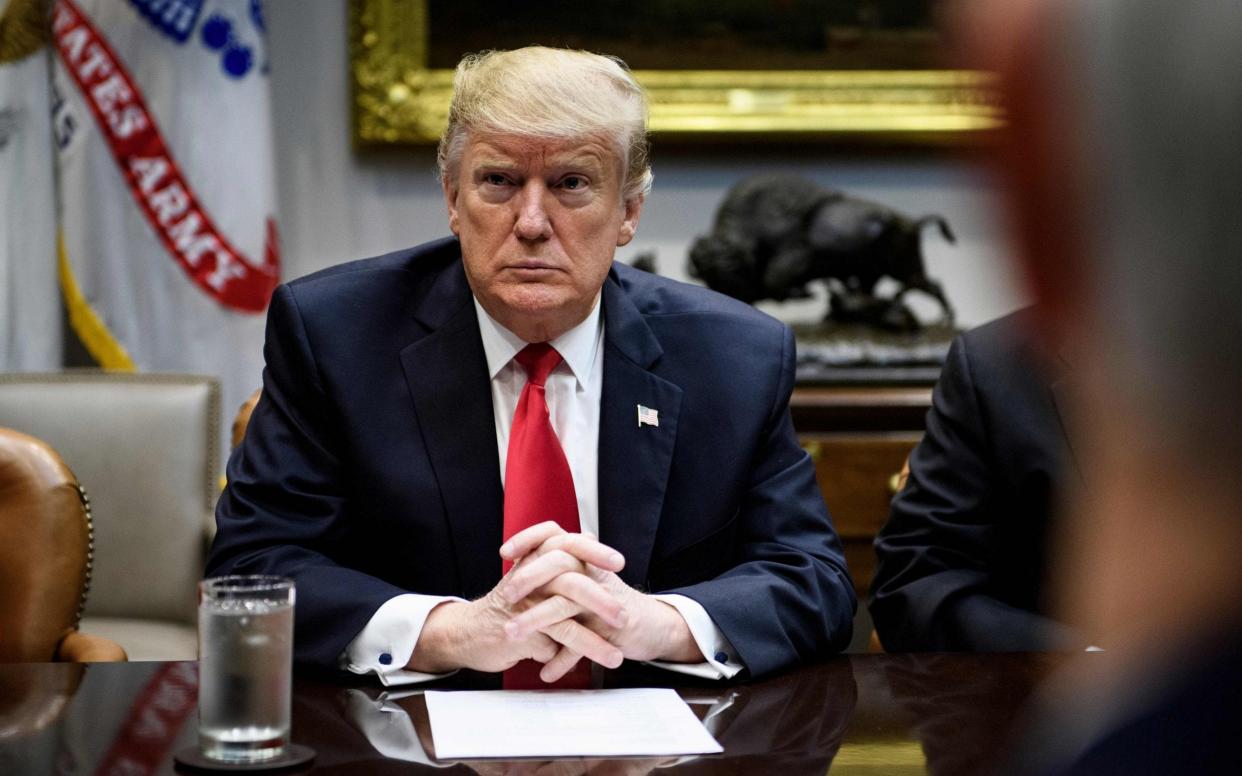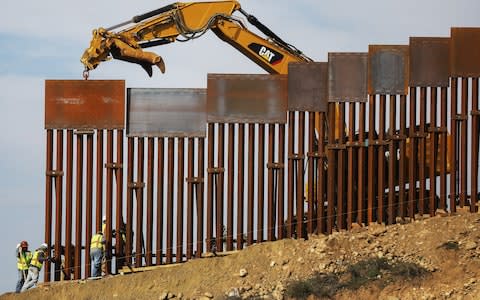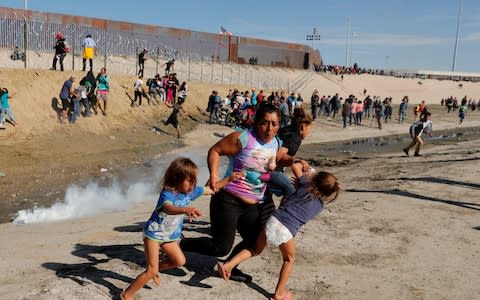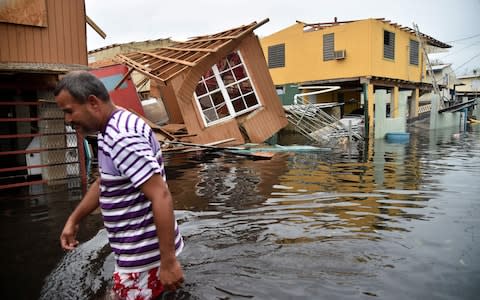Why Donald Trump is set to declare a national emergency to build his wall - and what will happen next

Donald Trump is poised to declare a national emergency in an attempt to fund his US-Mexico border wall without congressional approval.
The White House said the US President would sign a spending bill that would avert a government shutdown, but which only provides $1.375 billion for border barriers or fencing - far from the $5.7 billion Mr Trump wants.
"President Trump will sign the government funding bill, and as he has stated before, he will also take other executive action - including a national emergency," White House spokeswoman Sarah Sanders said.
The prospect of Mr Trump declaring a state of emergency to build his border wall had appeared more likely after he backed down in the shutdown standoff last month without securing funds for the barrier.
The specter of such action has produced widespread opposition in Congress, but Mr Trump is under pressure to soothe his conservative base and avoid looking like he's surrendered in his wall battle with Congress.

Such a move has been done before by past presidents but this time it would almost certainly face legal challenges.
What is a national emergency?
Passed in 1976, the National Emergencies Act allows the president to pronounce a national emergency when he deems it appropriate.
The act offers no specific definition of “emergency”, but the use of it has rarely been controversial.
However, because it allows a president to declare one entirely at his or her discretion, critics are accusing Mr Trump of "fabricating" a crisis at the southern border.
Why an emergency declaration?
The administration has spent months trying to figure out how the president might be able to move forward with the wall - the central promise of his 2016 campaign - if Congress refuses to give him the money.
As early as last March, Mr Trump was publicly floating the idea of using the military for the task.
Because of the $700 & $716 Billion Dollars gotten to rebuild our Military, many jobs are created and our Military is again rich. Building a great Border Wall, with drugs (poison) and enemy combatants pouring into our Country, is all about National Defense. Build WALL through M!
— Donald J. Trump (@realDonaldTrump) March 25, 2018
But it’s Congress - not the president - that controls the country’s purse strings and must appropriate money he wants to spend.
A emergency declaration, however, bypasses Congress. The White House counsel’s office is reviewing the option and among the laws Mr Trump could turn to is Section 2808 of the Title 10 US Code pertaining to military construction.
According to the statute, if the president declares an emergency "that requires use of the armed forces," the Defence Secretary "may undertake military construction projects, and may authorise the Secretaries of the military departments to undertake military construction projects, not otherwise authorised by law that are necessary to support such use of the armed forces".
Pentagon budget officials are analysing the 2019 construction budget to determine how many dollars would be available to use for the wall if Mr Trump opts for that path. Under the provision, only those construction budget funds that are not already set aside for other construction projects could be used for the wall.
There are more than 100 such provisions giving the president access to special powers in emergencies. And Congress has typically afforded the president broad authority to determine what constitutes an emergency and what does not, said Elizabeth Goitein, co-director of the liberty and national security programme at the Brennan Centre for Justice.
"Absolutely it’s an abuse of power for the president to declare a national emergency when none exists and to use it to try to get around the democratic process," she said. "But we are in a situation where our legal system for emergency powers almost invites that kind of abuse."
What would happen then?
Declaring an emergency to build the wall would likely trigger a torrent of legal challenges questioning the president’s authority as well as whether the situation at the border really constitutes an emergency. Mr Trump has been trying to press that case in recent weeks, insisting the situation qualifies as a security and humanitarian "crisis."
He’ll also face other questions.
"The problem for the Trump administration is that border security is fundamentally a law enforcement issue that does not require the use of the military," said Todd Harrison, a defence budget expert at the Centre for Strategic and International Studies. "So I think they would be on shaky legal ground trying to use emergency authorities this way, and it is almost certain that they would end up in court."
Asked if she would file a legal challenge to an emergency declaration, House of Representatives Speaker Nancy Pelosi said: "I may, that's an option."

Sen. Jack Reed, the ranking Democrat on the Senate Armed Services Committee, said it would be inappropriate for Mr Trump to use Section 2808.
"We are not at war with Mexico, and the proposed border wall has no core (Defence Department) function. Indeed, the Pentagon’s most recent National Defence Strategy doesn’t mention the southern border as a national defence priority," Mr Reed said.
Adam Smith, House Armed Services Committee Chairman, said even if Mr Trump could declare an emergency, it would be a "huge mistake."
"There clearly is no national emergency. But they asked me, ’Can he do it?’ Yeah he can. It would be wrong, it would be horrible policy and I’m totally and completely against it. But from a legal standpoint he can do it," Mr Smith told CNN.
He and others agreed any declaration would surely be challenged in court.
Has it been done in past?
National emergencies have been declared by a number of presidents in the past, mostly when it comes to economic sanctions against foreign actors whose activities pose a national threat.
Bill Clinton declared emergencies 17 times, one of which was announced during the Cuba embargo in 1996, when US ships or aircraft were prevented from entering Cuban territory without authorisation.
Barack Obama, meanwhile, declared one when tackling the H1N1 Swine Flu epidemic in 2009 in order to arrange proper patient treatment.
One of the 31 national emergencies still in effect is that declared by George W Bush in the wake of the terrorist attacks of September 11, 2001.
How could Congress or the courts challenge it?
While Mr Trump can declare an emergency when he wants, Congress theoretically does have the authority to cancel it - though such a move would be unprecedented.
The National Emergencies Act gives lawmakers authority to reject a declaration through legislation that would require majorities in the House and Senate.
Mr Trump would likely veto bill, after which lawmakers would have the chance to override it with a two-thirds majority vote. With Republicans in control of the Senate, that of course would be a tall order in the current climate.
The declaration would likely face a legal challenge in the courts, where presidential declarations have rarely been voided.

In 1952, President Harry Truman declared an emergency to take control of steel factories during the Korean War in response to a labour strike. By a 6-3 vote, the US Supreme Court ruled against the president. In an influential opinion, Justice Robert H. Jackson said Truman’s reliance on emergency power under the Constitution would hand too much power to the president - in stark opposition to the wishes of the framers.
However, that preceded the 1976 Act, which leaves the existence of an emergency wide open to interpretation.
"If President Trump declares a national emergency at the border, it is far from clear that courts would strike it down," writes Chris Edelson, Assistant Professor of Government at American University School of Public Affairs.
Where would the money come from?
Shifting money from accounts to deliver the $5.7 billion he wants will be tricky.
The administration has been eyeing several pots of money - including disaster funds, counter-narcotic accounts and military construction dollars - to fund Mr Trump's wall, according to congressional aides and White House officials.
One possibility is shifting a portion of the $13 billion in disaster aid Congress approved last year for Puerto Rico and a dozen states, including California and Texas, hit hard by hurricanes, flooding and other disasters. The money funds Army Corps projects, and the Puerto Rico aid alone totals more than $2 billion.

But Texas lawmakers revolted over White House plans to tap Hurricane Harvey funds, and Sen. John Cornyn said on Thursday they won assurances from the White House that the money won't be used for the wall.
A more likely option is the military construction account that's used to upgrade bases and facilities.
Congressional aides said there is $21 billion available. That includes about $10 billion in funds from the current 2019 fiscal year that ends September 30, and $11 billion remaining from the previous four years, said the aides.
But tapping the military construction money also may hit resistance. The money often goes for improvements to housing, roads, hospitals and other facilities, and can be used to eliminate mold or other hazardous problems at military installations in congressional districts across the nation and around the globe.
Potentially easier to tap is the military's counter-drug account, so-called Section 284 money, as suggested by Rep. Mark Meadows, a Trump ally and leader of the conservative Freedom Caucus. But it falls short of what's needed with about $800 million available.

